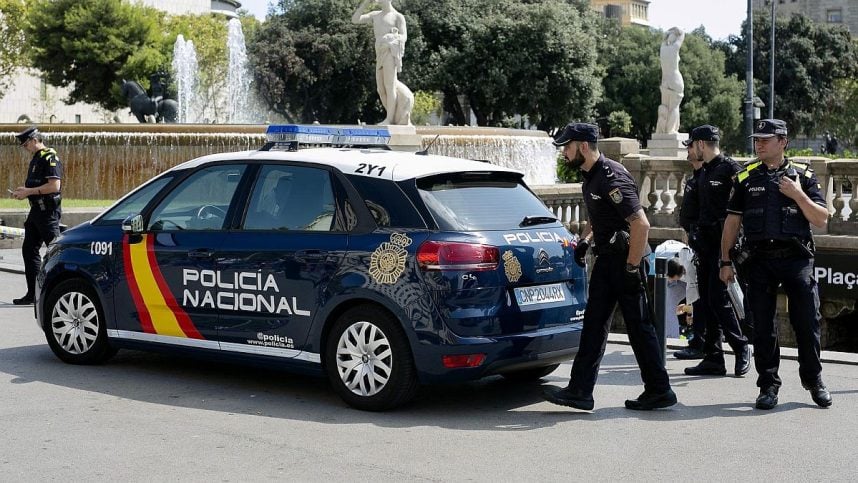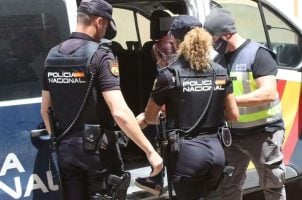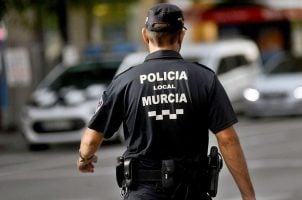Spain Police Bust Gang That Stole 260 IDs Used to Gamble Online
Posted on: April 4, 2023, 06:57h.
Last updated on: April 4, 2023, 10:22h.
Police across Spain have had their hands full in recent months as they combat organized crime targeting the gambling industry. A recent bust helped police crack a group that had hacked computer systems and stolen IDs to create online gaming accounts.

The so-called Pippen operation, coordinated by the Computer Crime Service of the Provincial Prosecutor’s Office in Granada, led to the arrest of the organization’s alleged leader in Madrid. It also put almost 50 people on the law enforcement radar for their possible involvement.
The gang’s unidentified leader faces a litany of charges, with more possible as the prosecutor’s office builds its case. So far, he’ll have to answer for money laundering, document forgery, usurpation of private data, computer hacking, and criminal conspiracy.
260 Victims and Counting
Police have already identified more than 260 victims across Spain and other countries whose identities the gang stole. This investigation is the continuation of Operation Jordan from a year ago, which dismantled a criminal organization that had allegedly hacked computer systems in Madrid and Granada. The gang used the data to open bank accounts and change the target accounts of existing payroll direct deposits.
At that time, police arrested eight people for the alleged fraud of about €53,000 (US$57,791) and searched three homes in and around Madrid. There, they found four high-end sports vehicles worth over €450,000 (US$490,680), about 50 computer devices used in the hacking, €70,000 (US$76,328) in cash, and about 400 forged bank cards.
With Operation Pippen, the investigation continued, thanks to the analysis of physical and digital documentation that Operation Jordan was able to uncover. Data forensics revealed the group falsified more than 300 credit cards and opened more than 1,000 bank accounts just for the gang’s leaders.
The analysis also found that the group branched out, using the accounts to form a complex financial structure. Its purpose was to conceal the transferred funds’ origin and destination, and to mask the money’s source. Police also determined that the crooks used the stolen identities to register with well-known online betting houses and took advantage of the sportsbooks’ new user registration bonuses. They also sold the IDs to others.
Spain requires sports bettors and gamblers to present an ID and a selfie when registering for an online account as a means to authenticate the individual. Making deposits through in-country bank accounts also requires that the account be in the person’s name. Unlicensed platforms don’t adhere to the rules, however.
Living the Good Life
To carry out these operations, the gang’s leaders used people they trusted to obtain new IDs and purchase documents on the internet. So far, investigators have identified more than 260 victims and purchased more than 1,500 identity documents, including driver’s licenses, national ID cards, passports, and more.
The group opened almost 1,000 accounts at different banks across the country. The investigation determined that they collectively held over €7.76 million (US$8.46 million). Data analysts are still figuring out how much of that is stolen money and how much was earned from the illegal gambling operations.
The head of the gang was living large at the time of his arrest. Police arrested him in a luxury villa outside Madrid worth €1.25 million (US$1.36 million). His various private bank accounts, those in his own name, held around €200,000 (US$218,000) and have now been frozen. In addition, authorities are trying to determine if he held any other assets that could have been the result of his criminal activity.
Related News Articles
Casino Workers Help Gang Steal Over $500K From Spanish Casinos
Casino Worker Steals $20K, Spends it at Casino
Spain Croupier Busted for Rigging Roulette Wheel So Father Could Win
Most Popular
LOST VEGAS: The Foster Brooks Robot at MGM Grand
Bally’s Sets Date for Tropicana Las Vegas Implosion & Party
Most Commented
-
VEGAS MYTHS RE-BUSTED: You Don’t Have to Pay Resort Fees
— August 2, 2024 — 16 Comments -
VEGAS MYTHS RE-BUSTED: Elvis Was a Straight-Up Racist
— August 9, 2024 — 11 Comments -
ANTI-SOCIAL BEHAVIOR: Vegas Casino Buffet Stunt in Poor Taste Goes Viral
— August 16, 2024 — 7 Comments -
VEGAS MYTHS RE-BUSTED: The Strip Tried Appealing to Families and Failed
— August 23, 2024 — 7 Comments
















No comments yet